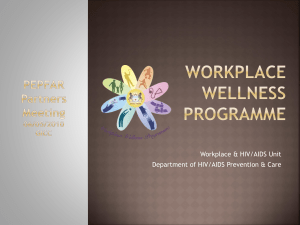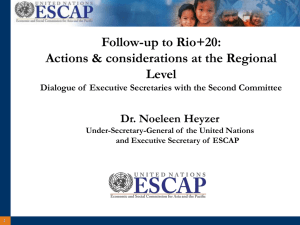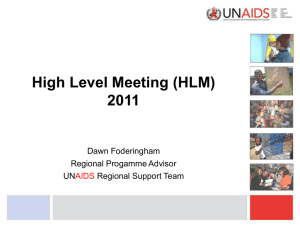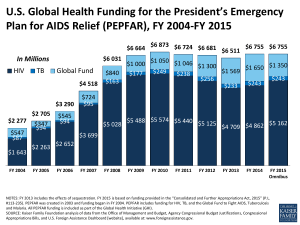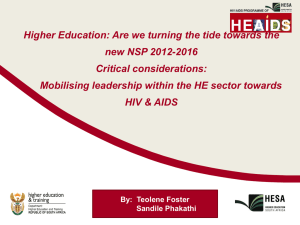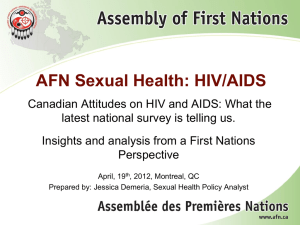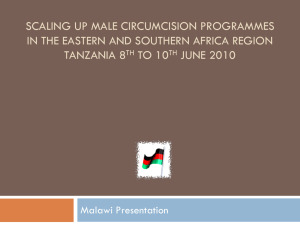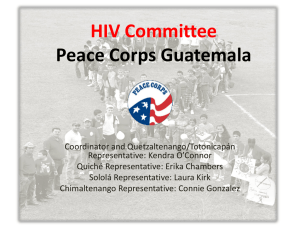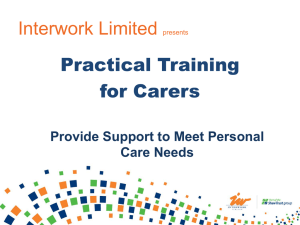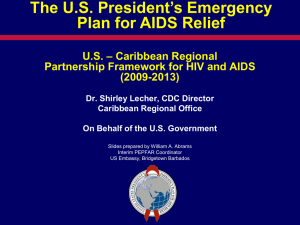Presentation of ESCAP Roadmap to 2015
advertisement
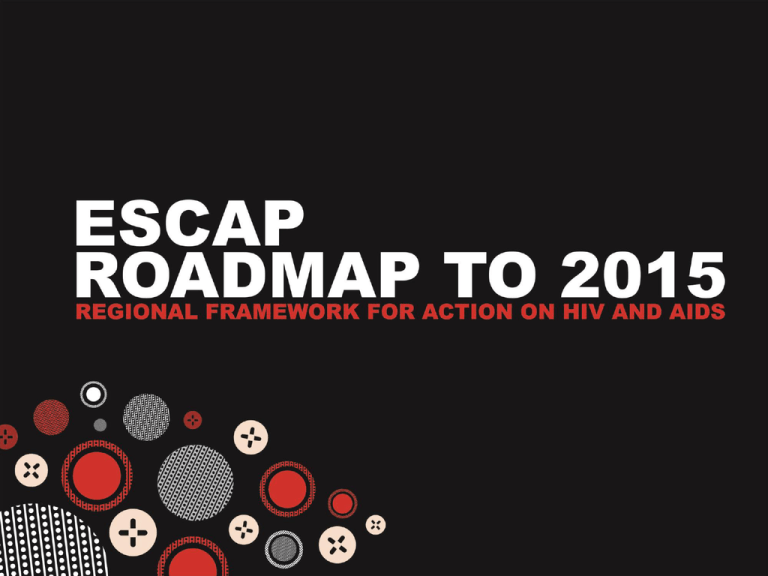
Asia-Pacific High-level Meeting on HIV and AIDS The Asia-Pacific High-level Intergovernmental Meeting on the Assessment of Progress against Commitments in the Political Declaration on HIV/AIDS and the Millennium Development Goals, held from 6 to 8 February 2012 in Bangkok, was the first regional intergovernmental meeting to be held since the adoption of the Political Declaration on HIV/AIDS: Intensifying our Efforts to Eliminate HIV/AIDS in June 2011. The Meeting was convened in partnership with seven other United Nations entities: UNAIDS, UNDP, UNODC, UNICEF, UNFPA, UNWomen, and WHO. At the Meeting, ESCAP member States endorsed a Regional Framework for Action on HIV and AIDS (also referred to as the “ESCAP Roadmap to 2015”) to support the implementation of international and regional commitments on HIV and AIDS. 68th Session of ESCAP In accordance with the established practice of the Commission, the report of the Asia-Pacific High-level Intergovernmental Meeting on the Assessment of Progress against the Commitments in the Political Declaration on HIV/AIDS and the Millennium Development Goals was submitted for consideration and a decision by the Commission at its sixtyeight annual session, held from 17 to 23 May 2012 in Bangkok. The Commission welcomed the outcome of the Asia-Pacific High-level Intergovernmental Meeting on the Assessment of Progress against Commitments in the Political Declaration on HIV/AIDS and the Millennium Development Goals, including the regional framework to support the implementation of international and region-specific commitments. It noted the importance of delivering on the commitments made by member States in the 2011 Political Declaration on HIV/AIDS adopted by the General Assembly at its High-level Meeting on AIDS as well as ESCAP resolutions 66/10 and 67/9. National Multi-sectoral Consultations on Policy and Legal Barries Both the 2011 Political Declaration on HIV/AIDS and ESCAP resolution 67/9 call for reviews, as appropriate, of “national laws, policies and practices to enable the full achievement of universal access targets with a view to eliminating all forms of discrimination against people at risk of infection or living with HIV, in particular key affected populations” (ESCAP resolution 67/9). These national consultations should be multisectoral, initiating a dialogue between the health sector and other sectors, including justice, law enforcement and drug control. The Roadmap suggests that countries consider reviewing the findings and recommendations of the Global Commission on HIV and the Law, engaging with key stakeholders including civil society and key affected populations, and addressing gender-related concerns in the conduct of the national reviews. National Multi-sectoral Consultations on Policy and Legal Barriers (cont’d) As of 1 December 2013, 18 countries in the ESCAP region had conducted at least one national multistakeholder consultation and/or review of the legal and policy barriers to universal access to HIV prevention, treatment, care and support: http://www.unescapsdd.org/hiv/reviewsconsultations-legal-barriers-hiv Participatory and inclusive national reviews on implementing the Political Declaration and ESCAP resolutions 66/10 and 67/9 In the 2011 Political Declaration on HIV/AIDS, Governments have committed to having evidence-based operational monitoring and evaluation and mutual accountability mechanisms between all stakeholders to support multisectoral national strategic plans for HIV and AIDS to fulfill the commitments in the Declaration, with the active involvement of people living with, affected by and vulnerable to HIV, and other relevant civil society and private sector stakeholders. Regional overview of progress in meeting the commitments in the Political Declaration and ESCAP resolutions 66/10 and 67/9 Inclusive regional intergovernmental review meeting of national efforts and progress 71st session of ESCAP General Assembly review of the MDGs
